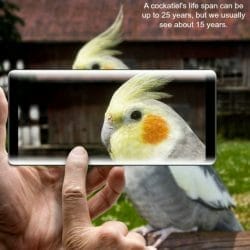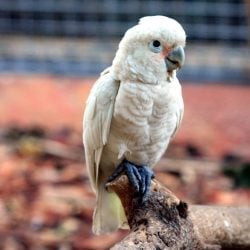Last Updated on by Catherine Tobsing
Sharon Mc. writes:
Hi Catherine,
Sunnie (if female)/Sunny (if male) was born on 4/27 and I brought her home on 6/27.
I held her a few times @ the owner’s when she was still being hand fed and with baby feathers. I brought her home @ 2 mos., as she was eating pellets on her own.
She was cuddly, would snuggle in my hand, and sit at length on my shoulder.
Recently, when I approach her cage, put my finger out and say, “Step up”, she lunged at me and BIT my finger/hand a few times HARD.
Why?
Are ringnecks territorial? Is this a phase? If I have (raw) sugar snap peas, thin slices of a baby carrot, or kernels of corn and offer it to her, she gently takes it.
She will, many times, come and eat on my hand.
Why is she biting?
I also give her a “treat” (unsalted sunflower seed) 5-10 a day which she loves!
Her original owner said sunflower seeds are no good because of their high-fat content and not to give the seeds to her.
My other ringneck (a definite male) – 4 mos. old, never did the biting.
He is close to Daddy whereas Sunnie is close to me. They’re in separate (open-door) cages but they come out on their own and socialize with each other daily.
Please advise me as to the biting and the sunflower seeds.
I’d appreciate your advice and I thank you in advance.
Sincerely,
A “well-bitten” Sharon
Dear Sharon
The breeder should never have given you the bird at 8 weeks old, Ringnecks are not ready to be eating on their own that young. That the bird made it okay is very good, but please watch to make sure he/she is eating enough food.
You should not put your hands into the bird’s cage to get it out. The cage is all the bird has to call its own unless it is an emergency and you have to grab the bird and go (like a fire), then wait until the bird comes out on its own.
When the bird crawls out and onto the door then they are in YOUR space and thus are easier to pick up.
Full transparency, I’ve had ringnecks in my life for almost 30 years.
Don’t hesitate when putting your hand out for the bird, hold your fingers together and keep flat, move under the front of the bird, below the belly, and keep moving until the bird has no choice but to get on top of your hand.
Is the bird perch trained yet? It is very important to learn that. If the bird gets nippy, the perch takes care of that problem.
Intro to stick perch video
If you are giving the bird sunflower seeds as treats then start making them work for you with Clicker training. It will come in handy and you will have a much better relationship with your bird.
Please note that having two young ringnecks at the same time will work against your taming.
Birds of a feather flock together and you have no feathers.
You may end up with a bonded pair and no pet for you. Even if they do not mate, having a male and female around may stimulate the female into starting to lay eggs, then for sure you will not have a tame pet and she will get very aggressive.
You will need to handle them often and separately to maintain their tameness. They may abandon you for each other. Do you have the room, funds, and time to handle a breeding pair of birds?
Please handle your situation carefully and think it out as to the direction you want to go.
60-second guide to clicker training ~ Video
Let me know if you seek further guidance.
Thank you
Catherine Tobsing
One of our customers with a similar parrot problem writes:
Twenty-eight-year-old Chaps, another of Landsperg’s adopted African grey parrots is phone-phobic as well.
“The lesson I learned from Chaps is that I cannot go near her when I’m on the phone,” says Landsperg.
“She bites hard but doesn’t draw blood. It’s not worth it to risk a bite from this otherwise sweet bird.”
“I began carrying her from place to place on a stick and, after two weeks, my fear subsided so I put away the stick and began carrying her on my hand at eye level and staring at her when we walked around.
She hasn’t bitten me since. Every now and again when I carry her, as a reminder, I look her in the eyes just to be sure. Whenever I am unsure of either bird’s emotions I carry them on the stick for safety’s sake.”
Author Profile

Latest entries
 Bird & Parrot CareJune 20, 2025Understanding the Best Way to Use Prevue Pets Mimic Me Voice Trainer
Bird & Parrot CareJune 20, 2025Understanding the Best Way to Use Prevue Pets Mimic Me Voice Trainer Bird BehaviorJune 6, 2025How Do I Keep My Parrot From Dumping His Food Every Day?
Bird BehaviorJune 6, 2025How Do I Keep My Parrot From Dumping His Food Every Day? Birds & LightingMay 16, 2025I Am Seeking Clarity About Lighting for My Birds Cage
Birds & LightingMay 16, 2025I Am Seeking Clarity About Lighting for My Birds Cage Bird RescueApril 29, 2025How Do We Re-Home a 17 yr Goffin Cockatoo?
Bird RescueApril 29, 2025How Do We Re-Home a 17 yr Goffin Cockatoo?



